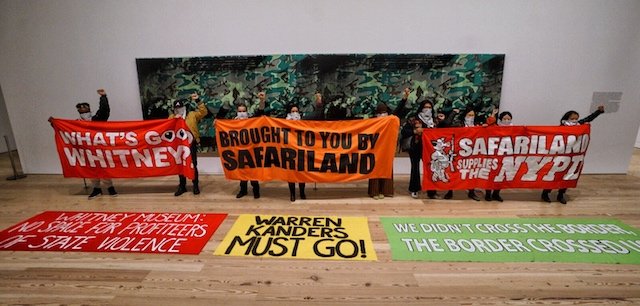Protests Continue Over Whitney Museum Board Member Who Owns Tear Gas Manufacturer
May 3, 2019, 5:03 p.m.
Warren Kanders, vice chair of the board, owns a defense manufacturer whose weapons have been used against asylum seekers at the U.S.-Mexico border.

A coalition of activists have been leading demonstrations at the Whitney for weeks now.
For the seventh week in a row, activists have been mounting demonstrations in protest of a Whitney Museum board member, Warren Kanders, who has ties to a defense manufacturer whose tear gas canisters have been used against asylum seekers at the United States-Mexico border.
Youth and student demonstrators from the likes of CUNY and NYU, many of whom have organized through the group Decolonize This Place, will be staging a protest outside of the Whitney tonight (Friday). There, they'll be holding a "block party and series of teach-ins from different youth organizations working on decolonization struggles," in an event that will feature "chalking, a potluck, and music," according to the event page.
In the nine weeks leading up to the Whitney's big-ticket annual Biennial show, the growing coalition of demonstrators have demanded that the museum remove Kanders as the vice chair of their board, a position he's held since 1996. Kanders bought Safariland, a company that has links to supplying police forces in Ferguson, Missouri, and Baltimore, Maryland, in 2012. In November 2018, Hyperallergic published a report detailing Kanders's role as the chairman, CEO and owner of the weapons manufacturer, whose tear gas canisters and smoke grenades were reportedly used against asylum seekers at the border between Tijuana, Mexico and San Diego, California.
The story prompted an open letter from over 100 Whitney staffers, many of whom learned of Kanders's contentious ownership role through the article, not their employer. In it, they urged the institution to implement a concrete policy around Trustee participation, release a statement about the article in question, and convey their concerns to the board. "First and foremost, some of us are deeply connected to the communities that are being directly impacted and targeted by the tear gassing at the border," they wrote. "For the Whitney not to acknowledge that this news may impact its staff is to assume we are separate from the issue, that it is happening somewhere else to some other people."
Kanders responded to the staff's open letter in a missive addressed to the Whitney Board of Trustees, in which he acknowledged his role in Safariland and defended his involvement in it, particularly involving the use of tear gas canisters (which he dubbed "non-lethal products"). And in a statement directed at Whitney employees that did not mention Kanders by name, the museum's director, Adam Weinberg, wrote, "To those of you, and I trust it is nearly all, who want to move forward despite some significant differences of opinion, I am here as your partner, to lead and to work hard every day to make the Whitney, and possibly the world, a better place. The Whitney declined to comment for this story.
In solidarity with Whitney staffers, Decolonize This Place held an initial protest at the Whitney in December, where they burned sage in reflection of the tear gas being used at the border. In March, they kicked off Nine Weeks of Art and Action, each of them highlighting individual issues and illustrating how many communities are affected by companies like Safariland, from Puerto Rico to Palestine. The idea, organizer Amin Husain says, is to "set in motion a set of conditions that could move the Whitney leadership to actually remove Kanders and begin a more interesting conversation with community, with artists, and so forth."
Earlier this week, news broke that an estimated 50 of the 75 artists participating in the upcoming Biennial have also implored Kanders to step down. (Decolonize This Place did not play a role in this letter, Husain adds).
"We can imagine artists then continuing on the organizing, inside and outside the Biennial, you could see people adjust their art to address this," he says. "This isn’t about 'burn down the museum,'" Husain says. "It’s more like the museum needs to be held accountable. And if it’s not, we are."